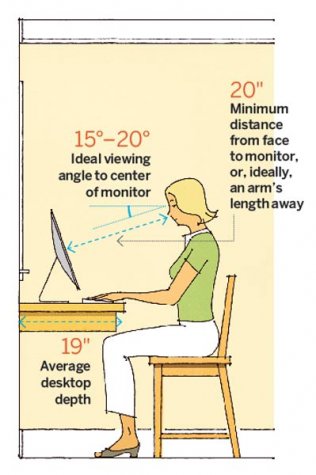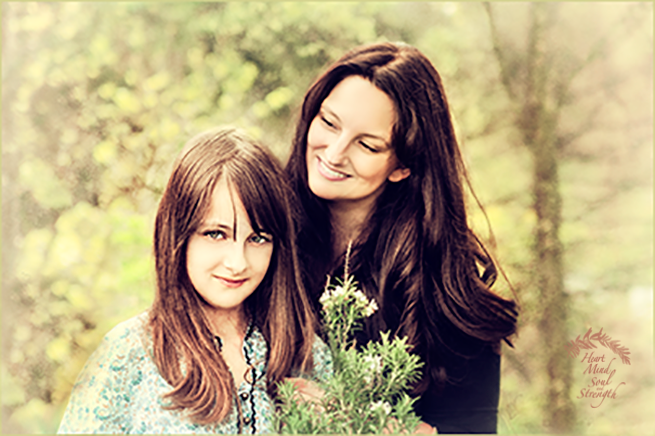My neck is killing me. Ok, so not killing me literally. Ever had a stiff neck that wouldn’t go away? Better check your posture. A couple of months ago my massage therapist recommended that I work on my posture. Yep, I knew I needed to improve that. However, it sure isn’t a one-time decision to stand up straight and then Presto! you bear yourself regally ever after. Oh, no. It’s minute by minute trying to be aware of my poor posture and correcting it.
So I’m realizing that there are factors that contribute to my poor posture. Did you know that your elbows should be at the same level as your keyboard when typing? Did you know that your monitor should be as close to eye level as possible? Try following both of those when using a laptop to work! Actually, I did find a source that gave the correct angle for laptop viewing. It’s 15-20 degrees. It occurred to me that I could put a book under the hinged side of my laptop to raise the screen a bit so I wasn’t looking so far down with my neck kinked. The added benefit is that the keyboard is now slanted at a comfortable angle. Here is an illustration by Arthur Mount from the This Old House website regarding the angle. I also started sitting on a cushion so my elbows are the same level as the keyboard. I’m learning to check my posture at the kitchen sink. Not pretty. I’ve enlisted my husband’s help to remind me to stand straight. He willingly does this because he’s sick of my migraines associated with neck pain. Pain causes me to slump, but slumping increases and even causes pain. This bad cycle must be stopped. How can you become more aware of your poor posture habits?
be at the same level as your keyboard when typing? Did you know that your monitor should be as close to eye level as possible? Try following both of those when using a laptop to work! Actually, I did find a source that gave the correct angle for laptop viewing. It’s 15-20 degrees. It occurred to me that I could put a book under the hinged side of my laptop to raise the screen a bit so I wasn’t looking so far down with my neck kinked. The added benefit is that the keyboard is now slanted at a comfortable angle. Here is an illustration by Arthur Mount from the This Old House website regarding the angle. I also started sitting on a cushion so my elbows are the same level as the keyboard. I’m learning to check my posture at the kitchen sink. Not pretty. I’ve enlisted my husband’s help to remind me to stand straight. He willingly does this because he’s sick of my migraines associated with neck pain. Pain causes me to slump, but slumping increases and even causes pain. This bad cycle must be stopped. How can you become more aware of your poor posture habits?
There are also psychological factors I’m uncovering regarding my poor posture. I’m guessing I’m not the only one who has issues in these areas. Slumped shoulders can be an outward signal that the inner person is feeling a lot of pressure; like the weight of world is on their shoulders. Often these people are conscientious, trying to do what is expected of them. They have learned from an early age to keep their head down and work, thus staying below the radar of criticism. They feel responsible for others, being anxious to help them. Often they feel apologetic for their very presence in another’s life. Added to this is the fact that they don’t like arrogance in others and don’t want to appear arrogant themselves. They fear if they stand up straight they will be perceived as trying to call attention to themselves. Sound familiar? Do you spot some wrong assumptions? Can you spot them in your own thinking?
A short bio may not seem apropos to this topic of bad posture, but  humor me a minute. You may find something in common with my experiences. When I was 3 or 4 years old, my parents separated. This precipitated my mother and I living with relatives for several (formative) years. I was keenly aware of being on someone else’s turf. I knew that I mustn’t rock the boat or we’d be homeless. I learned to constantly read the emotional temperature of others and make adjustments to my behavior accordingly. I accommodated, tried to please, and basically walked on eggshells until my mother was able to rent a little apartment for the two of us when I was seven. However, I was still young and my elderly grandmother was called upon to babysit me after school and summers while my mother worked long hours. This meant that I needed to appease her because she hadn’t signed up for this duty and I needed to make myself as useful as possible. Then there were the times my father returned and stayed with us. Some periods he came every weekend. Other times we didn’t see him for a year. But when he was with us, I learned to play by his rules because his fuse was short and because I knew my mother still loved him and reveled in his visits. By middle school, I was old enough to be alone after school and it was a great relief to have quiet, alone time in my own space. But my life took an unexpected turn when my mother died in my junior year of high school. Yet again living in other people’s homes, trying to fit in, not cause waves, and generally making myself as likable as possible to make up for the obvious inconvenience of my presence. Then there was college and my overbearing roommate. Sigh. While I was attending a cousin’s wedding, she called my boyfriend, soon to be fiancé, and detailed all the reasons why he shouldn’t marry me. Fortunately, he didn’t listen to her and married me anyway. But marriage brought yet another adaptation challenge. I will also mention that for ten years we lived in a foreign country where I tried hard to fit into their culture and not offend. Then our six children entered their teen years each reacting to those turbulent years in their own ways. How to survive four teenage girls’ PMS at the same time? How to adjust to their varying needs and personalities?
humor me a minute. You may find something in common with my experiences. When I was 3 or 4 years old, my parents separated. This precipitated my mother and I living with relatives for several (formative) years. I was keenly aware of being on someone else’s turf. I knew that I mustn’t rock the boat or we’d be homeless. I learned to constantly read the emotional temperature of others and make adjustments to my behavior accordingly. I accommodated, tried to please, and basically walked on eggshells until my mother was able to rent a little apartment for the two of us when I was seven. However, I was still young and my elderly grandmother was called upon to babysit me after school and summers while my mother worked long hours. This meant that I needed to appease her because she hadn’t signed up for this duty and I needed to make myself as useful as possible. Then there were the times my father returned and stayed with us. Some periods he came every weekend. Other times we didn’t see him for a year. But when he was with us, I learned to play by his rules because his fuse was short and because I knew my mother still loved him and reveled in his visits. By middle school, I was old enough to be alone after school and it was a great relief to have quiet, alone time in my own space. But my life took an unexpected turn when my mother died in my junior year of high school. Yet again living in other people’s homes, trying to fit in, not cause waves, and generally making myself as likable as possible to make up for the obvious inconvenience of my presence. Then there was college and my overbearing roommate. Sigh. While I was attending a cousin’s wedding, she called my boyfriend, soon to be fiancé, and detailed all the reasons why he shouldn’t marry me. Fortunately, he didn’t listen to her and married me anyway. But marriage brought yet another adaptation challenge. I will also mention that for ten years we lived in a foreign country where I tried hard to fit into their culture and not offend. Then our six children entered their teen years each reacting to those turbulent years in their own ways. How to survive four teenage girls’ PMS at the same time? How to adjust to their varying needs and personalities?
So with a long history of people pleasing, I arrive at old age- it’s official as of last month. Old age and a nagging pain in my neck. Has any of this sounded familiar to you? Please don’t think I’m suggesting that being sensitive to the needs of others is wrong, or that I think I should be selfish in my approach to life. I’m saying that my motive for being in constant tune to others’ moods was self-serving. I was actually looking out for myself and not looking out for their needs with a genuine concern. It was fear, not love that made me pliable.
 I’m good at peace at any cost. Appeasing in order to prevent conflict because I’m not brave enough to confront and actually fix the problem. Even tho I know controlled confronting is the more loving thing to do for the good of the other and the good of the relationship, I shrink back. My temporary comfort is more important to me than the improvement of the relationship and the betterment of the other. That’s selfish. Help me, Lord.
I’m good at peace at any cost. Appeasing in order to prevent conflict because I’m not brave enough to confront and actually fix the problem. Even tho I know controlled confronting is the more loving thing to do for the good of the other and the good of the relationship, I shrink back. My temporary comfort is more important to me than the improvement of the relationship and the betterment of the other. That’s selfish. Help me, Lord.
I’m good at serving in hopes of feeling good about the outcome. Someone needs help to get ______ done. I help them accomplish the goal. I’ve contributed to a happy ending. Feeling good. But I want to serve whether or not I get satisfaction from a good outcome. Or even whether or not I’m appreciated. Can I still feel content when what I worked hard on doesn’t turn out well and the person I tried to help doesn’t respond kindly? I want to be like the One who came not to be served, but to serve. He gave everything he had, but the results weren’t gratifying. His friends abandoned him, and he got executed like a criminal. Yet he confidently proclaimed that he finished what he came to do. Outcomes, it turns out, can’t be judged on immediate appearances.
Others of you don’t relate to any of this because you have developed a healthy self-image that doesn’t feed off others. That is my goal. I want to stand tall acknowledging my faults, but stepping forward with courage to claim new ground. I am what I am. God loves me as I am, and he loves me enough to keep nudging me to a better place. I can feel the refreshing wind in my face as I turn to please him and worry less about people pleasing for self-preservation and self-validation.